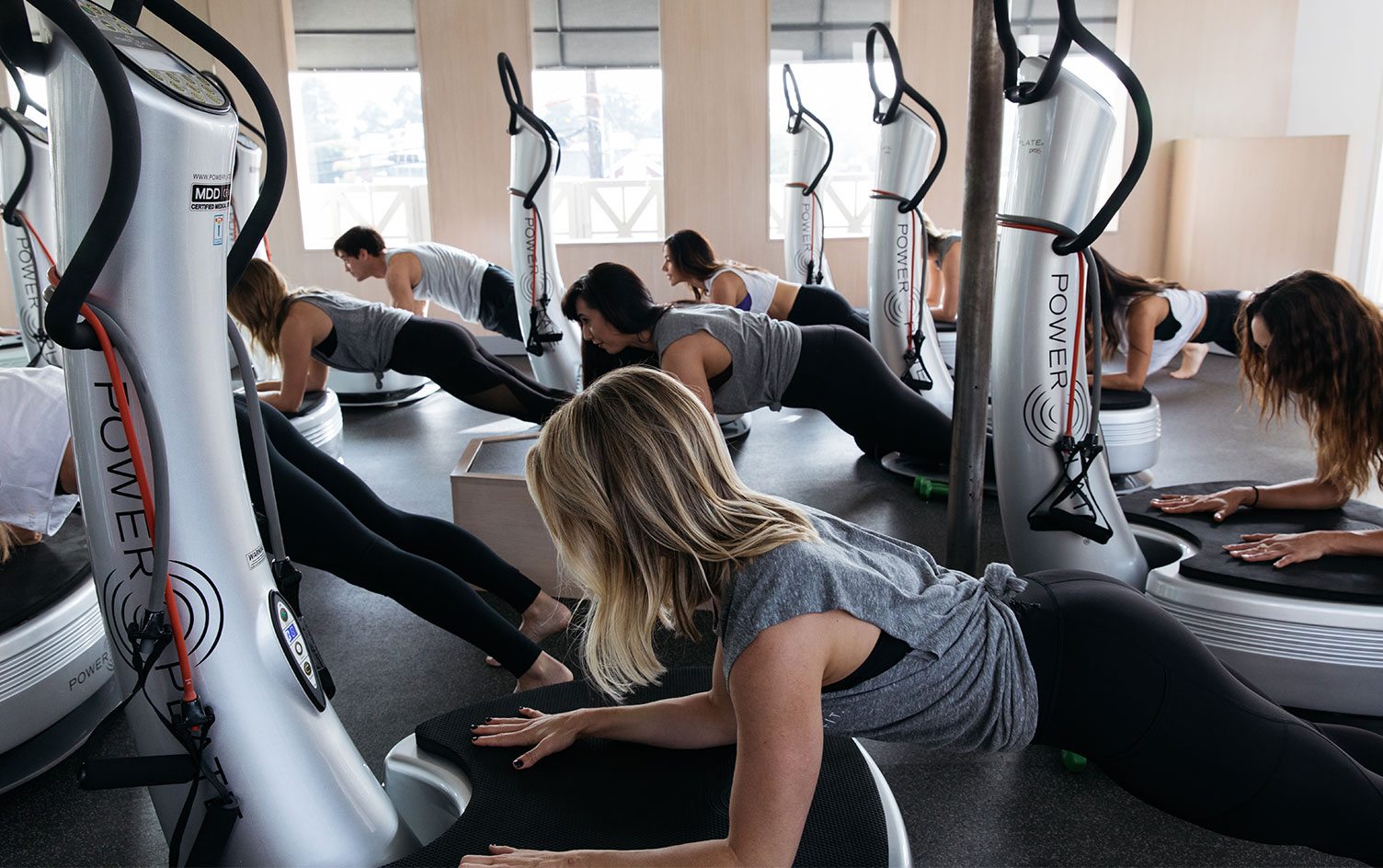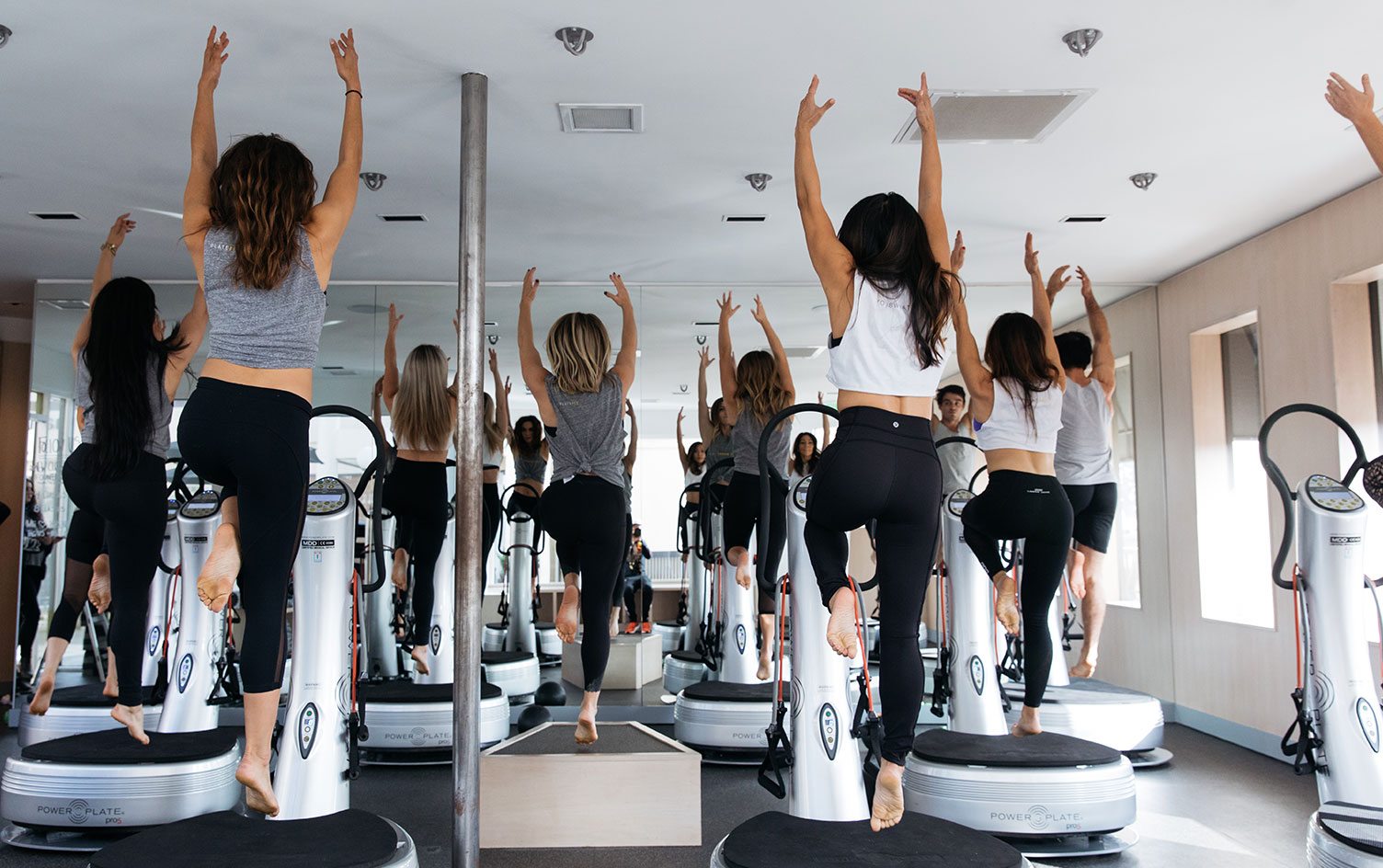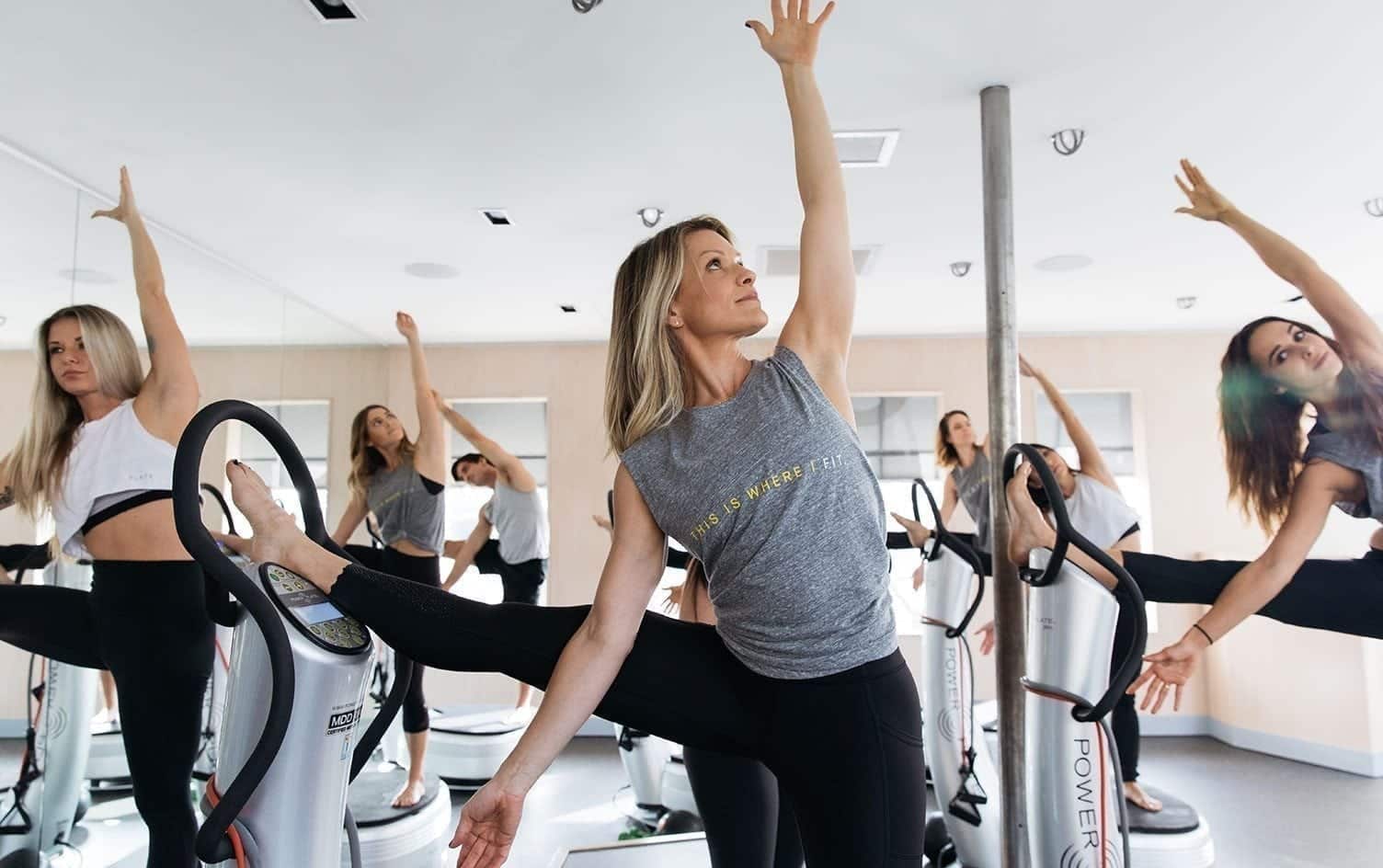“This might tickle your nose. That’s normal,” says my fitness instructor Brooke Pascoe — not words you typically hear when you’re about to start a workout. But this isn’t just any workout. This is Platefit, an uber trendy L.A. fitness studio where class-goers exercise on a vibrating box called a Power Plate.
THE BASICS
Power Plate technology is nothing new — the former Soviet Union used vibrating plates in the ‘60s to keep Russian cosmonauts’ muscles from atrophying in space, and celebs ranging from Madonna to Eva Longoria sing its praises. But the workout has only recently become popular to a wider public, thanks largely to fitness studios like Platefit, which opened its doors to the public just last year.
Every Platefit class is totally different, which keeps you from getting bored. Platefit offers bootcamp-style classes, barre classes, yoga spin-offs and kickboxing classes at its two studios in West Hollywood and Brentwood. The common thread tying these classes together is the mixture of cardio, strength and recovery done in each class on the power plates.
“The machine moves up and down, front to back, right to left,” says Platefit creator Rachael Blumberg. By vibrating your muscles, you ensure they’re constantly engaged, dialing up the impact of your workout. “It’s medically proven to accelerate your workout,” she adds. “It also helps with cellulite and makes you look younger.”
Research backs up the health and fitness claims. A 2017 study of obese mice in the journal Endocrinology found that whole-body vibration had a positive impact on the mice’s metabolism, much like actual exercise, reducing insulin levels. Research from SANADERM Professional Clinic for Skin Disease and Allergology also found that just exercising on a PowerPlate for 8–13 minutes, 2–3 times a week resulted in a 25.7% reduction in the appearance of cellulite over six months.
The PowerPlate has long been a secret of celebs and those wealthy enough to own the plates or work out on them with personal trainers. Blumberg trained people privately in West Hollywood for 10 years before deciding to open her doors to the public.

MY EXPERIENCE
I took one of their most popular classes in the Brentwood studio, PLATEFIT-PowerPlate, which incorporates calisthenics and bodyweight exercises into the mix.
Pascoe starts out class by getting us to jog in place on the plates, which helps me get used to the strange new sensation. The power plate “contracts your muscles 30–50 times per second,” explains Blumberg. “That’s 900 times in 30 seconds. It’s like an intensified bosu ball, using 98% of your muscle fibers.” To say the vibrating plate “might tickle” is an understatement. The vibration made my ears feel oddly full; I couldn’t speak without my voice shaking; my eyes were watering; every single muscle fiber in my body — muscles I didn’t even know existed — felt like they were twitching simultaneously.
Next we’re doing jumping jacks, then squat jumps — all on the plates. This is an interval-style class, and we’re switching between moves really quickly — often in less than a minute. Then, Pascoe amps up the intensity, leading us into a super fun series of double-legged donkey kicks, as we hold onto the vibrating hand rails for dear life. Before I know it, we’ve switched to boxing, and I’m cranking out a series of uppercuts and crossbody jabs. Every move seems designed to work as many different muscle groups as possible. Case in point: I find myself standing with one leg on the plate and one on the ground, a weight in one arm. We bend one leg, raising our knees to meet the opposite elbows, crunching our abs while simultaneously doing reps with the weight. Now that’s multitasking!
Thankfully the classes are short — only 27 minutes. I feel like I’m going to collapse into a sweaty twitching heap when we hold planks with our hands on the vibrating plate. At one point I actually retreat into a child’s pose, but manage to force myself to go on. We do what feels like a never-ending series of running planks, plank jacks and plank twists. As if that wasn’t challenging enough, Pascoe instructs us to do side planks while doing weight reps with our upper hand. Platefit lets its instructors bring their own personality to class, and Pascoe’s is creative with high energy, albeit mildly torturous, sequences. At one point, we hold medicine balls over our heads and smash them down on the plate. It’s a killer arm workout and definitely gets your aggression out on the plate, like payback time. We end in a series of stretches, which feel like a well-deserved treat.

Though many swear by whole-body vibration training regimens, they’re not for everybody. The British Journal of Sports Medicine reports: “when vibration transmission frequency is too high, some can experience motion sickness-like symptoms.” The Power Plate company explains that people with conditions such as vertigo and detached retina might be sensitive to vibration and ought to consult their physician before integrating the plates into their workouts. Thankfully, while having a machine contract my muscles 30–50 times per second did feel pretty strange, I soon got used to the sensation and was able to stick it out.
READ MORE WE TRIED IT FOR YOU
> SweatBox
> PlyoJam
> Barry’s Bootcamp
THE VERDICT?
The beauty of Platefit is that it’s an incredibly efficient full-body workout. Sure it feels pretty bonkers, but for those unafraid of trying something new, it can be an exhilarating experience. Sometimes, just trying to stay balanced or not curl up in a ball and tap out was a challenge for me. My muscles hurt in the good way the next day — a sign of a solid workout. Don’t be surprised if you go back for more after you try it once. “I loved it the moment I got on it,” says Blumberg. “The increased circulation was addicting. I fell in love with the results.”
Blumberg suggests that newbies “keep an open mind” and try it more than once before they make up their minds about the workout. “It’s a funny sensation the first time.”
If you don’t live near Platefit, Power Plate also lists personal trainers and fitness studios who use its plates.




